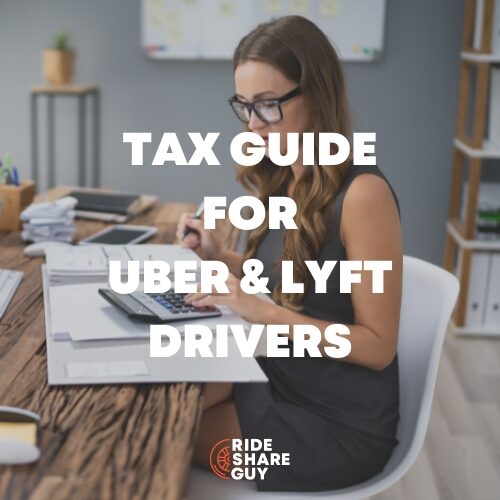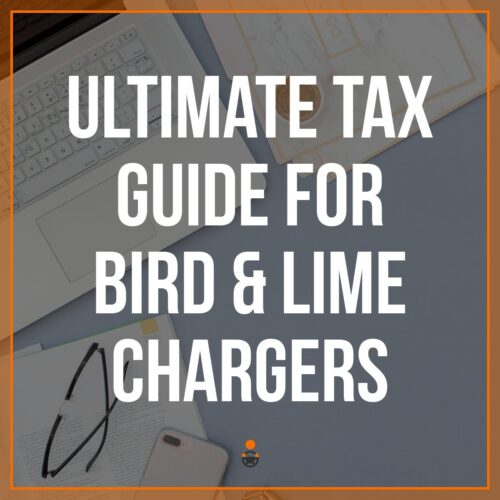Gig workers are small business owners.
Whether you are a rideshare owner/operator or a contract delivery truck driver, you are (in most cases) operating your own small business.
Some of you are solopreneurs and own/operate your own vehicle. Some of you have larger companies that manage fleets, employees, and other assets including vehicles and associated real estate like garages, offices, parking lots, and more.
As any good entrepreneur will tell you, it’s not just about what you make, it’s about what you keep. If you live in the US and want to optimize your post-tax income as a small business owner in 2023 and beyond, you need to understand which tax credits and deductions might be available to you.
Learn More about Rideshare Taxes in our Full Tax Guide for Uber & Lyft Drivers
7 Tax Tips for Gig Workers
Here are 7 important tax tips for gig workers that can save you a TON of money when you file next year.
1. Should You Start an LLC or an S-Corp?
First things first, should you operate as an S-Corp or an LLC? Well…it always depends on your personal situation.
An LLC is the most common entity type in the US. It’s simple, takes ~30 minutes to set up, offers some protection from personal liability, and doesn’t require a ton of paperwork. With an LLC, your income and losses pass through directly to your personal tax return.
The downside is that in some states like California, LLCs have to pay an annual tax of $800. So you’d need to weigh whether the additional cost is worth any liability protection.
S-Corporations, on the other hand, are simply LLCs that make the Small Business Corporation election with the IRS. These are typically better if you’re making more gross income. These carry a few advantages.
By electing to be an S-Corp, you are allowed to pay yourself a reasonable salary (The IRS determines “reasonable” based on what others might make in the same role) and then you can take the remainder of your income as dividends or “distributions” which can significantly reduce your self-employment tax liability.
In the US, FICA payroll taxes are currently 15.3%. With an S-Corp, you can avoid these taxes on the portion of your income that you take in distributions above your salary.
Depending on your situation, filing as an S-Corp, paying yourself a reasonable salary, and taking tax-advantaged distributions can save you a TON of money at the end of the year.
2. Section 179
If you operate a vehicle or a fleet of vehicles for a living, this is one of the most famous deductions available to you.
Here’s what it is.
Section 179 allows businesses to take an immediate deduction for business expenses related to depreciable assets such as equipment or vehicles.
They have different deductions available for “light,” “heavy,” and “other” vehicles depending on their weight.
For light vehicles under 6000 lbs, you are allowed to write off up to $20,200 in the first year.
For “Heavy” vehicles over 6,000 lbs, you can write off up to 80% of the purchase price in year 1, with a maximum deduction cap per vehicle of $28,900 in 2023. This is great for anyone thinking about driving an SUV on Uber Black for example.
For “Other” vehicles above 14,000 lbs like buses, transport shuttles, large trucks, etc., you can write off 100% of the purchase price in year 1.
Obviously, all of these vehicles need to be explicitly used for business purposes. That means more than 50% of all miles driven (excluding your daily commute) must be for business use to qualify.
If you are adding vehicles to your fleet this year, I recommend that you consult with your CPA to determine how best to take advantage of this tax deduction this year.
3. The Standard Mileage Deduction
The standard mileage deduction is another incredibly helpful deduction for business owners who operate vehicles.
That said, you can’t double dip and also take the Section 179 deduction on the same vehicle in the same year. The standard mileage method works best for lower-cost vehicles, where you might get a longer lifetime deduction on miles than depreciating the cost of the vehicle. Full-time rideshare drivers will typically put at least 1,000-1,500 miles per week on their vehicle so the standard mileage deduction can really add up and offset a lot of your income.
As of right now, the standard mileage deduction is 65.5 cents per business mile driven. The best news? There’s no upper limit for how many miles you can deduct if you drive full-time for work.
However, the standard mileage deduction rates can change from year to year, so it’s important to double-check with your CPA when you file.
Just make sure that these miles are well documented for business use (which again excludes your daily commute) and you’ll be good to go.
Check out this list of the best mileage tracker apps.
Other Expenses
Below is a list of “other expenses” you can deduct if you own a business.
4. Home Office Deduction
If you use part of your home exclusively for your work, you may qualify for a home office deduction. This can include a percentage of your rent or mortgage, as well as utilities.
5. Health Insurance Deduction
If you are self-employed and pay for your own health insurance, you can deduct the premiums you pay.
6. Education and Training Expenses
If you take courses or purchase materials to improve your skills in your current line of work, you might be able to deduct these as business expenses.
7. Retirement Contributions
Contributions to a SEP IRA or a solo 401(k) plan can be deducted from your taxable income, reducing your overall tax liability.
Final Caveats and Important Reminders
As with anything related to your personal or business taxes, you should always consult with your own CPA when it comes time to file.
Additionally, don’t forget to track all income and expenses! This might seem obvious, but you’d be surprised how many people overlook it. Keep a detailed record of all income and expenses related to your work.
Lastly, don’t forget about Quarterly Estimated Taxes. As a gig worker, you will typically need to pay estimated taxes on a quarterly basis. If you don’t, you might face an underpayment penalty when you file your tax return.
If you found this article helpful, my business partner Mitchell Baldridge and I recorded an hour-long webinar including 11 tax tips for small businesses that you can watch here. We cover S-Corps, Section 179, the standard mileage deduction, and more.
Onward and upward,
Nick Huber
President, Bolt Storage
Co-Founder:
- Re Cost Seg
- Titan Risk
- Tax Credit Hunter
- Support Shepard
- Recruit Jet
- WebRun Labs
- Blue Key Capital
- BoldSEO
- AdRhino
- Spidexx
…and more coming soon.
@SweatyStartup on Twitter, LinkedIn, Instagram, TikTok, Spotify, and Apple Podcasts
Save this link for my upcoming book The Anti Entrepreneur (coming in 2025)
Bonus: Check out Harry’s interview with Nick on Wannabe Angels!



